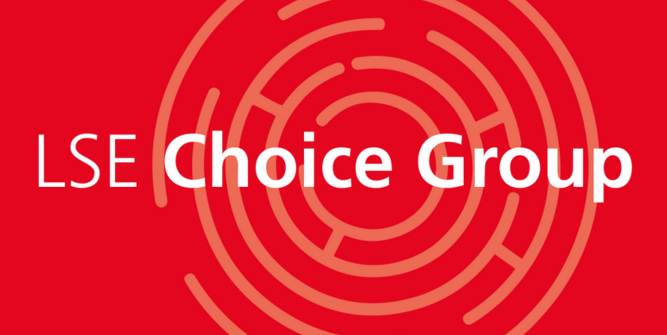Event Categories: BSPS Choice Group Conjectures and Refutations Popper Seminar Sigma Club

- This event has passed.
Choice Group Seminar by Lea Bourguignon (LSE), Milan Mossé (UC Berkeley) and Laura Engel (Universität Hamburg)
15 November 2023, 5:00 pm – 6:30 pm
Event Navigation

Choice Group Seminar – PhD Edition
Talk 1: Lea Bourguignon (LSE) and Milan Mossé (UC Berkeley): ‘How to Count Sore Throats’
Abstract: Kamm’s sore throat case gives us a choice: save one life, or save a distinct life and cure a sore throat. We defend the ex ante explanation of the judgment that one should flip a coin to decide whom to save: it is disrespectful to let a sore throat act as a tie-breaker, because an individual would be forced to forgo a 50% chance of living (given to them by a fair coin flip), which cannot be outweighed by any number of sore throats. We show that this explanation of when and why claims can permissibly break ties generates new problem cases for theories of aggregation, including theories that have been thought to accommodate the judgment that one should flip a coin in Kamm’s sore throat case, and that it sheds new light on the debate between ex ante and ex post views of social risk.
Talk 2: Laura Engel (Universität Hamburg): ‘Group Deliberation and Epistemic Dependencies’
Abstract: Group deliberation is becoming an increasingly important tool in epistemic democratic decision-making as many political theorists hold that if individuals deliberate with each other, they are likely to become better informed or to get closer to the correct or best decision. On the other hand, there are common objections against this position, arguing that the necessarily serial nature of deliberation leads to path-dependency, cascading effects and resulting, epistemically unfounded, polarisation. Proponents of deliberation often claim in response that the described, epistemically harmful, effects are not applicable to deliberation as deliberation relies on a specific type of communication that avoids those epistemic traps. However, they often remain vague on what exactly it is about deliberative communication that is supposed to neutralise cascades and path-dependencies – and how. In this talk, I will propose a model for group deliberation that enables us to take a closer look at its structure and to discuss which characteristics, if any, of democratic deliberation can help fulfil the epistemic promise of democratic deliberation.
This event will take place in person on LSE’s campus. However, those unable to attend in person will have the option of taking part online.
To join online just follow these instructions:
- Download Zoom
- Zoom link for this for this meeting: https://lse.zoom.us/j/6613924533
Please note that these events are routinely recorded, with the edited footage being made publicly available on our website and YouTube channel. We will only record the audio, the slides and the speaker and will not include the Q&A section. However, any question asked during the talk itself will feature in the final edit.

